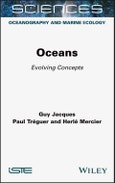Since the HMS Challenger expedition of 1872?1876, our vision of the ocean has changed completely. We now understand that it plays a key role in biodiversity, climate regulation, and mineral and biological resources, and as such, the ocean is a major service provider for humanity.
Oceans draws on data from new oceanographic and satellite tools, acquired through international interdisciplinary programs. It describes the processes that control how the ocean functions, on different spatial and temporal scales. After considering the evolution of concepts in physical, chemical and biological oceanography, the book outlines the future of a warmer, acidified, less oxygenated ocean. It shows how a view of the ocean at different scales changes how we understand it. Finally, the book presents the challenges facing the ocean in terms of the exploitation of biological and mineral resources, in the context of sustainable development and the regulation of climate change.
Oceans draws on data from new oceanographic and satellite tools, acquired through international interdisciplinary programs. It describes the processes that control how the ocean functions, on different spatial and temporal scales. After considering the evolution of concepts in physical, chemical and biological oceanography, the book outlines the future of a warmer, acidified, less oxygenated ocean. It shows how a view of the ocean at different scales changes how we understand it. Finally, the book presents the challenges facing the ocean in terms of the exploitation of biological and mineral resources, in the context of sustainable development and the regulation of climate change.
Table of Contents
Introduction - Look from space: the planet "Ocean" rather than planet Earth - Brief history of the ocean planet, from its origins to the present day - The Challenger expedition: the birth of oceanography Part 1 - Evolution of concepts since the Challenger expedition1- The ocean acquires a third dimension
2- From ocean physics to ocean-atmosphere interactions
3- From marine chemistry to marine biogeochemistry
4- From marine biology to biological oceanography
5- From the azo abysses to hydrothermal ecosystems
Part Two - Concepts for the 21st Century Ocean
1- From large to small scale: importance in physics, biogeochemistry, and biology
2- Ecosystem approach to the exploited biological resources
3- Integrated approach to a warm, acidified, deoxygenated ocean Outlook
- Comparative evolution of concepts in oceanography and other natural sciences
- The challenges of oceanography beyond the sciences sensu stricto.








